This article represents part 3 of a series on how insulin has been unfairly demonized by many in the nutrition field. If you have yet to read the first few parts, you can read Part 1 here, and you can read Part 2 here. In this article, I will discuss how dairy products are among the most insulinemic foods out there, yet do not promote fat or weight gain, which pokes holes in the hypothesis that carbohydrates drive fat accumulation through insulin secretion.
Dairy Products Are Insulinemic Yet Don't Promote Weight Gain
One of the premises of individuals like Gary Taubes is that carbohydrates stimulate fat accumulation by stimulating insulin secretion. I've already shown how this premise is flawed in the last two parts of my series. Namely, I showed how protein also stimulates insulin secretion (sometimes as much as carbohydrate) yet does not promote weight or fat gain. I also showed how the drug exenatide restores rapid-phase insulin secretion in diabetics yet promotes weight loss.
If the carbohydrate/insulin hypothesis were true, then we would predict that foods that are extremely insulinemic would be uniquely fat promoting. What many people do not realize is that dairy foods are among the most insulinemic foods out there. In fact, they create much greater insulinemic responses than you would expect based on their carbohydrate content. Not only that, but lactose, the primary carbohydrate in dairy foods, is actually low glycemic and produces slow rises in blood sugar (lactose has a glycemic index of 46 compared to white bread which is 100). In fact, the glycemic index of many dairy products is quite low, with full-fat milk at 39, skim milk at 37, ice cream at 51, and fruit yogurt at 41.
Despite the low blood sugar responses, dairy products create very large insulin responses. For example, in one study, dairy products created similar or greater insulin responses than white bread, despite the fact that the blood sugar response for some of the dairy products was 60% lower than the white bread. In this study, the researchers compared the glycemic and insulinemic responses between white bread, a low gluten/lactose mixture, a high gluten/lactose mixture, cod with added lactose, milk, whey protein with added lactose, and cheese with added lactose. All of the conditions contained 25 grams of carbohydrate and 18.2 grams of protein, except for the white bread and low gluten/lactose mixtures, which contained 25 grams of carbohydrate and 2.8 grams of protein. Thus, lactose was the carbohydrate in all of the conditions except for white bread.
When you look at the insulin area-under-the-curve (AUC) for the various conditions, you can see that the dairy products actually created greater insulin responses than the white bread, despite having similar amounts of carbohydrate:
It is obvious that it is not the lactose that is responsible for the greater insulin response, because the gluten/lactose and cod/lactose mixtures resulted in similar or lower insulin responses to white bread.
The blood sugar response was also not responsible for the greater insulin response. In fact, the blood sugar response was lower in all of the conditions compared to the white bread, with the milk creating the lowest blood sugar response yet 3rd highest insulin response:
The insulinogenic index, which relates the amount of insulin secretion to the blood glucose response, was significantly higher in the dairy products, indicating that the dairy products stimulated much greater insulin secretion that you would expect based on the blood glucose response:
This is not the only study to show the insulinemic effects of dairy products. I showed in my previous article how whey protein, a dairy protein, created the highest insulin response compared to non-dairy proteins. In a study on type 2 diabetics, the inclusion of whey protein in a meal increased the insulin response by 31-57%, while the blood glucose response was reduced by up to 21%. In another study, the addition of 400 mL of milk to a bread meal increased the insulin response by 65%, despite the fact there was no change in the blood glucose response. In this same study, the addition of 200 or 400 mL of milk to a spaghetti meal increased the insulin response by 300%; again, there was no change in the blood glucose response. In fact, drinking milk with the spaghetti meal created an insulin response that was similar to white bread.
Here's the results of another study showing the glycemic and insulinemic indexes of milk compared to white bread:
Why Does Dairy Stimulate So Much Damn Insulin?
It is clear that dairy products stimulate large amounts of insulin secretion, as much or more than white bread. One of the reasons dairy products create large insulin responses is due to their amino acid content. In fact, the postprandial insulin response from dairy products correlates with the rise in branched chain amino acids leucine, valine, and isoleucine. I already pointed out in part 1 of this series how leucine will directly stimulate your pancreas to produce insulin.
Another reason that dairy products stimulate so much insulin secretion is their effects on a hormone called glucose-dependent insulinotropic polypeptide (GIP). Like GLP-1 which I wrote about in part 2 of this series, GIP is an incretin. This means that it is a hormone produced by your intestines that stimulates insulin secretion. Dairy products stimulate increased production of GIP. In the study I discussed earlier which compared whey, milk, and cheese to white bread, whey and cheese resulted in 21-67% greater GIP responses than white bread:
The above data illustrates one of the problems with the carbohydrate/insulin hypothesis...it assumes that carbohydrate is the primary stimulus of insulin secretion. However, it is clear that amino acids and incretins play significant roles in insulin secretion as well. And as I pointed out in part 1 of this series, the blood sugar response of a food only explains 23% of the variation in the insulin response. Thus, a lot more goes into insulin secretion than the blood sugar response from eating carbohydrate.
Dairy and Weight Gain/Loss
It is clear that dairy products are extremely insulinemic, moreso than many high carbohydrate foods. Thus, if the carbohydrate/insulin hypothesis were true, then we would predict that a diet high in dairy products should promote weight and fat gain. However, studies fail to show any relationship between dairy product intake and weight gain. For example, there is no relationship between intake of dairy products and BMI in Japanese women. In U.S. men, there is no relationship between an increase in dairy consumption and long-term weight gain. In perimenopausal women, high intakes of dairy products are actually inversely associated with weight gain (i.e, higher dairy product intakes are associated with less weight gain).
While these are observational studies, the results from controlled studies on animals and humans are similar. In fact, animal studies show less weight gain when they are fed dairy products. In mice, yogurt supplementation results in less weight and fat gain than controls on isocaloric diets. In another study, transgenic mice lost weight on energy restricted diets. The mice were then allowed to eat ad libitum (i.e., as much as they felt like). The mice fed dairy products regained less fat and weight during refeeding. In a third study, the intake of dairy products, but not a calcium supplement, decreased weight gain and body fat in mice fed a high-fat diet. In a fourth study, dairy protein attenuated fat gain in rodents fed a high-fat, high-sugar diet. In a fifth study, a dairy diet attenuated weekly weight gain in Sprague-Dawley rats.
Of course, these are animal studies. What about humans? In one study, low-fat dairy products did not promote weight gain, while high-fat dairy products did. Hmmm, could it be that the weight gain in this study was simply caused by excess calories and not insulin? In another study, increased intake of dairy products did not affect body composition. In a third study, increased intake of dairy products did not impair weight loss. In a one-year study, increased intake of dairy products did not affect changes in fat mass. In a 6-month follow-up to this study, high dairy product intake predicted lower levels of fat mass. In a 9-month study, increased intake of dairy products did not affect weight maintenance, but the high dairy group exhibited evidence of greater fat oxidation.
Why Am I Not Fat?
My own personal experience with dairy fits right in with the science. I consume a lot of dairy and have for many years. I go through 2-3 gallons of milk per week. I also go through a lot of Greek yogurt, cottage cheese, regular cheese, and whey protein. I have some type of dairy with just about every meal. Thus, I have large amounts of insulin flowing through my body pretty much all day. If insulin was truly the fat-promoting, weight-gaining hormone that some have made it out to be, then I should be obese by now. Yet, I am not...not even close.
Not only that, but the people who think insulin makes you hungry, that would imply that I should be starving all of the time with all of the insulin that is flowing through my body all day. Yet, I'm not.
Got Milk? Got Insulin!
The evidence is overwhelming that dairy products do not promote weight gain, and they actually inhibit weight gain in animal studies. This is despite the fact that dairy products produce very large insulin responses, as much or greater than many high carbohydrate foods. Thus, it is clear from this article, as well as my previous articles, that the carbohydrate/insulin hypothesis is incorrect. Insulin is not the criminal in the obesity epidemic; instead, it is an innocent bystander that has been wrongly accused through guilt by association.
Click here to read part 4 of my series, where I address the misconception of how insulin regulates blood sugar.

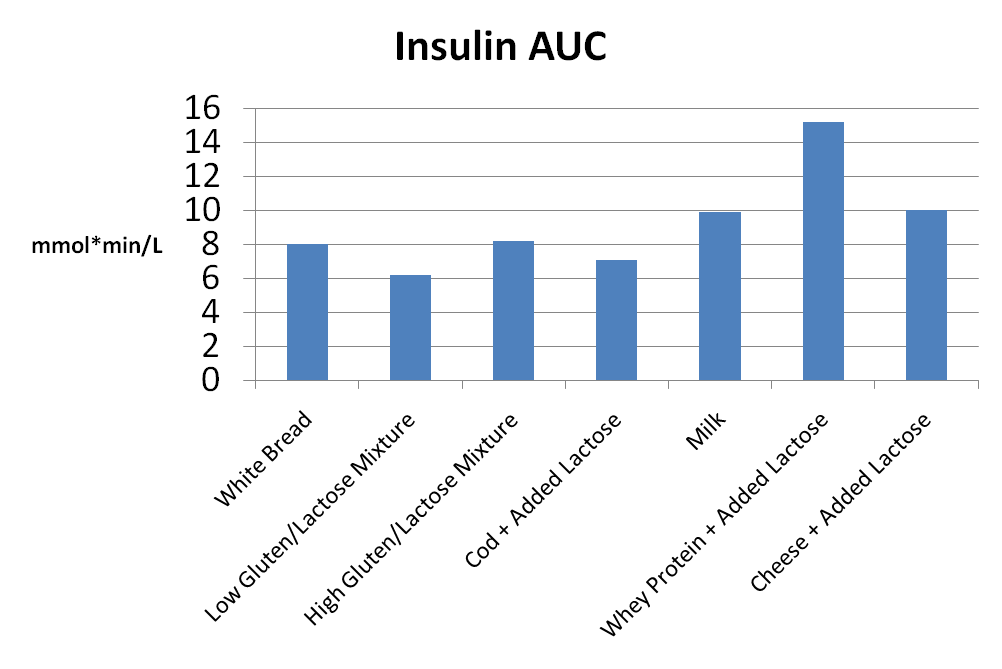
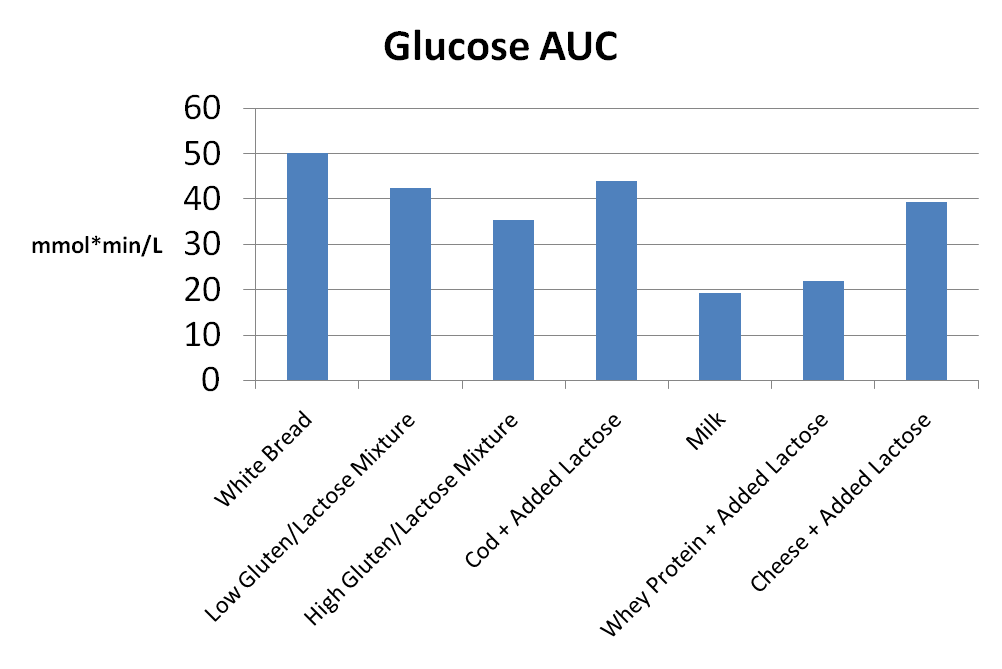
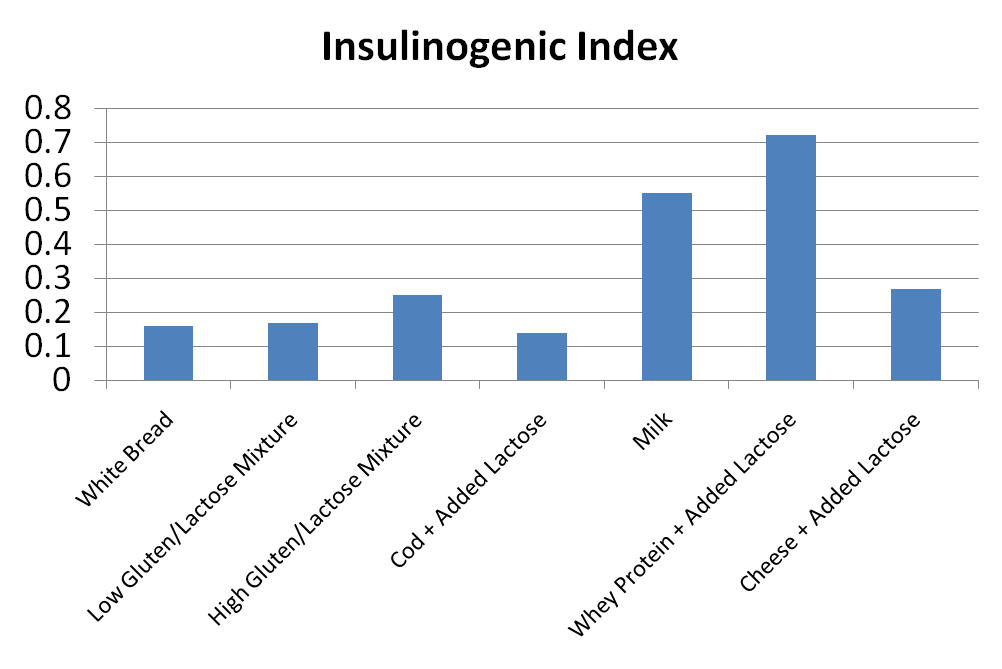
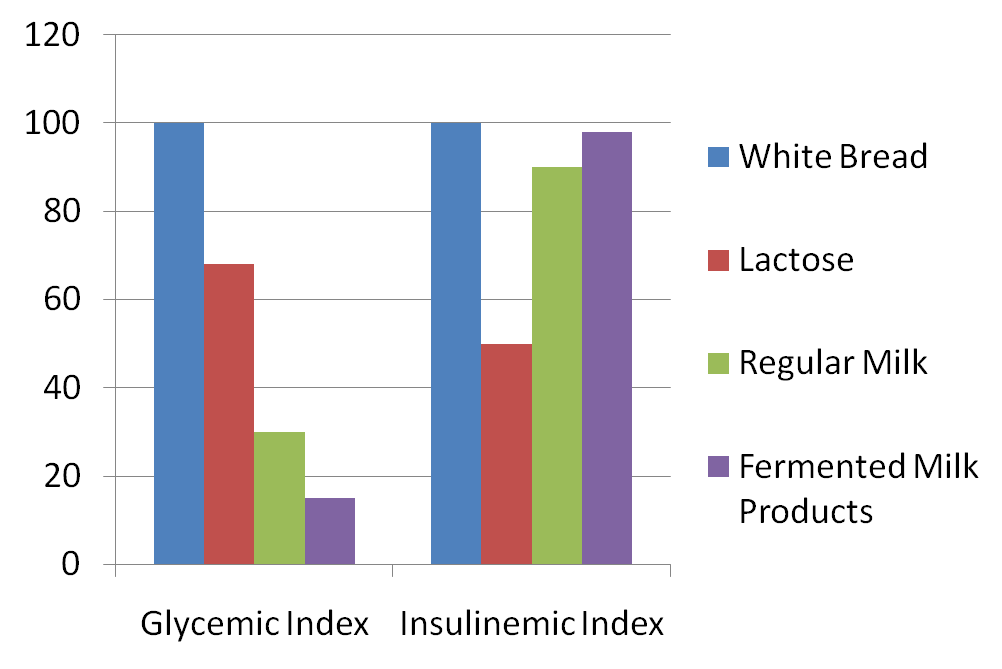
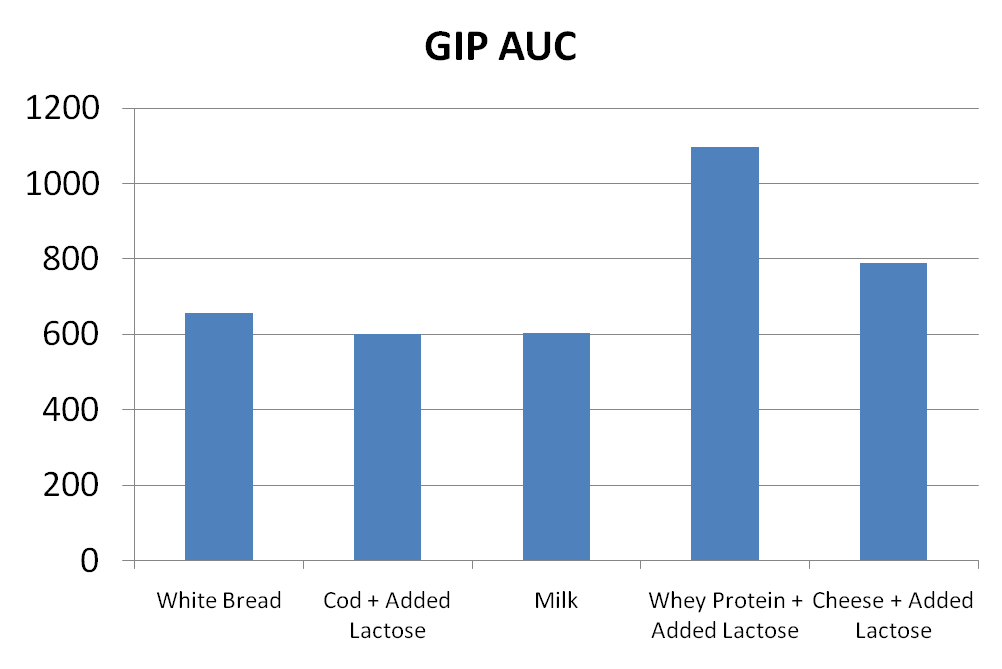
Excuse my ignorance, but what is the Insulin release, in response to Amino acids in the dairy, achieving? What is it released for?
To reduce muscle protein breakdown and facilitate the entry of amino acids into muscle tissue
Thanks for the article information. Insulin deserves attention!
hug
Based on the latest food insulin index test data I can’t see that the insulinogenic effects of dairy products (along with other foods) are explained by their carb, protein and fibre content.
See https://www.facebook.com/groups/optimisingnutrition/permalink/1420009241633453/
I would be interested in your thoughts.
There may not be a specific thing that dairy does to cause weight gain (other than the fat content) but fat is 9 calories per gram and carbs is 4 (often less) so you have to burn off a lot more calories or restrict portions if you eat dairy and meat, etc. Plus animal products are shown to increase cholesterol and saturated fat – leading ot heart disease – possibly even from the proteins (also shown to be associated with various cancers from casein).
GLYCEMIC INDEX, CARBS, INSULIN INDEX, ETC. ARE NOT THE WHOLE STORY IN THE OBESITY/DIABETES/SATIETY LANDSCAPE.
Thanks for the great website. Lots of useful info here.
Looks like there is a lot more going on that we do not know for sure. I agree with all your points. There are many paradoxes, such as:
Milk: High insulin index, yet helps with weight loss, filling, satisfying.
Yogurt: very healthy, satisfying with less calories, yet high II?
Potatoes: High GI, high II, yet Pima Indians and many other countries subsist mostly on them and hardly develop diabetes.
Who are these “people”? airush box kites for sale Excellent post. I used to be checking continuously this weblog and I’m inspired! Personal Injury Lawyer San Diego As is revealed by the accompanying video, it’s the victims who are doing the legwork. Before insisting on a court date, consult a personal injury attorney to establish the best possible course of action … does floetrol really work s Informative article, exactly what I wanted to find. Feel free to visit my weblog – does floetrol really work Really? What do Lawsuits have to do with the point of the article? Cheerleading… Read more »
Who are these “people”?…This website is a sham people. Apparently Ginardo, you’ve never run a website before. If you have, you would know who “these people” are. They are spam-bots that have left spam in the commentary on my site. I have Akismet to help filter and block spam comments, but it does not catch every single piece of spam. So occasionally I have to go through and remove the spam comments manually. Read my comment above where I show how the author uses a misinterpretation of scientific results to distort and misrepresent. I did not mirepresent anything or distort… Read more »
Your premise is wrong. You say : “Thus, if the carbohydrate/insulin hypothesis were true, then we would predict that a diet high in dairy products should promote weight and fat gain.” — and — “Thus, it is clear from this article, as well as my previous articles, that the carbohydrate/insulin hypothesis is incorrect.” NOPE. SORRY. This study does not refute, but rather actually extends and strengths the carbohydrate/insulin hypothesis. The carbohydrate/insulin hypothesis is the idea that the metabolic response to the intake of carbohydrates creates a blood sugar spike and results in insulin being created. If Milk or protein also… Read more »
Your premise is wrong. Actually, it is not. It is clear to me Ginardo that you do not understand the process of hypothesis testing or exactly how science works. For a lesson on how it works and how it relates to nutrition, read here. The issue is not insulin at all. The issue is the underlying metabolic processes that drive the creation of insulin as a result of the spike in glucose or amino acids due to protein. The issue is the constant on-going elevation of insulin levels because of the daily constant intake of carbohydrates. Having an insulin spike… Read more »
This means that if you do not manage to settle with an
adjuster, and you want to pursue your child’s claim, you will need the
help of a lawyer. Affordability: Always make sure that you pay a fair amount for the services of your Denver slip and fall lawyer.
To learn more about selecting the right Milwaukee personal injury attorney, go to.
after reading some articles on stephan guyenet’s website I have now come to the conclusion that the carbohydrate hypothesis is wrong. However that is not to say that carbohydrates are not uniquely fattening via another mechanism, i.e. leptin resistance. Fructose and lectins (found in grains) for example have been found to be particularly prone to causing leptin resistance. And the food reward signals of sugars and wheat (which breaks down into opioids) are also detrimental. furthermore, there is still significant evidence that hyperinsulinemia causes numerous health problems, even if obesity is not among them. For example hyperinsulinemia has been shown… Read more »
If that were true, if carbohydrates were fattening and reducing them would solve the problems we should see a 100% success rate from those people eating a low carb or no grain or no fructose diet, this is the only way to empirically validate the “theory” because it’s not a theory that leave room for exceptions. And this is the problems: dozens of metabolic ward studies show no advantage of eating a low carb diet. No less insulin, no less appetite, no less fat gains. And the net is full, and we’re talking hundreds and hundreds of post of people… Read more »
“dozens of metabolic ward studies show no advantage of eating a low carb diet”
Links to abstracts or it didn’t happen.
“At this point there’s no scientific empirical proof”
… in your comment supporting any of your wild claims. You might want to fix that. Or to try, at least.
do you really believe that I need to post any study showing that low carb diet have no advantage over other diets when they have been all quoted by James here in this series of articles on insulin? Why are you here if you didn’t even read a word of what James wrote? And by the way the weight of the proof in not on me but on people like you making ridicolous claims because honestly it’s so ridicolous to even believe that reducing carbs without reducing calories could lead to lack of weight gain (i.e the most anti-survival mechanism… Read more »
“do you really believe that I need to post any study showing that low carb diet have no advantage”
Absolutely, yes. The rest is noise and I didn’t even read your comment beyond this point.
I won’t repeat what James has already posted in this series that would be redundant as there’s nothing new under the sun. But again, hundreds and hundreds (you just need a google search for lowcarb forums) of real life anecdotes plus controlled studies show people need to consciously reduce calorie as a low carb diet didn’t forbidden them from getting used to fatty foods and overeating on them gaining fat, of course, in the process. Yes it works for some, it stops working after some time as they adapt to the new foods and it never worked for many. Consciosly… Read more »
You don’t need to repeat what he posted, just provide links to the articles where he (or anyone, really) referenced any studies that confirm your fantastic claim that low-carb diets don’t work. The present article is not a good source, as it deals with some rather technical issues about insulin and with the effects of dairy, which is decidedly NOT the same thing as comparing the effectiveness of low vs. high-carb diets. Show me the (way to the) anti-low-carb studies. It’s your job to do the work of driving your argument home, not mine. You haven’t provided a single link… Read more »
after reading some articles on stephan guyenet’s website I have now come to the conclusion that the carbohydrate hypothesis is wrong. However that is not to say that carbohydrates are not uniquely fattening via another mechanism, i.e. leptin resistance. Fructose and lectins (found in grains) for example have been found to be particularly prone to causing leptin resistance.